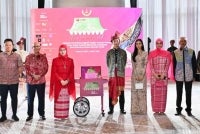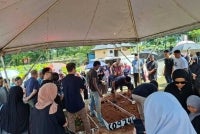Aging Malaysia needs smarter urban planning, not endless expansion - Expert
Sustainable cities depend on regenerating old spaces, not urban sprawl

As Malaysia moves towards an ageing society, the focus should shift from expanding urban areas to regenerating existing spaces, says Think City Managing Director Datuk Hamdan Abdul Majeed.
In a recent interview with Sinar Daily, Hamdan stressed the importance of adaptive urban planning, particularly in renewing older buildings—some with historical significance—to provide sustainable solutions. He warned against unchecked urban sprawl and advocated for a holistic approach that repurposes spaces to create flexible, community-driven environments.
SHAH ALAM - Malaysia must prioritise the regeneration and repurposing of existing spaces over continuous urban expansion, according to Think City Managing Director Datuk Hamdan Abdul Majeed.
As the country transitions into an ageing society within the next 15 to 20 years, urban planning must evolve to accommodate changing lifestyles and the growing demand for smaller, more efficient spaces.
Hamdan stressed the need to assess whether older structures are beyond saving or hold potential for renewal.
Some buildings may carry historical significance, while others can be adapted for modern use. A deep understanding of these spaces is crucial to effective regeneration.
"We need to start by understanding the space, which is the first step, followed by discovery, ideation and developing concepts. From there, we engage stakeholders and bring the community together."
"It's about listening to the community's priorities while also introducing ideas they may not have thought of, creating places that reflect their needs and aspirations,” he said.
Hamdan described buildings and spaces as valuable assets, emphasising that understanding their current and future roles is key to maximising their potential.
He called for regeneration, adaptive reuse and rehabilitation of existing structures before considering urban expansion, as this approach supports sustainability, reduces waste and prevents urban decay.
“Given Malaysia’s trajectory toward an ageing society where over 15 per cent of the population may be above 65 within 15 to 20 years, spatial needs will change,” he added.
He stated that people will likely prefer smaller, more manageable spaces with greater flexibility rather than being tied to large assets.
As generational preferences change, mobility and adaptability are becoming more important, reinforcing the need to rethink how urban spaces are utilised.
Hamdan pointed out that as people migrate to newer properties, older ones are often abandoned, contributing to a cycle of unsustainable development.
To tackle this, policies should incentivise the reuse and adaptive repurposing of existing buildings, integrating them into a sustainable development framework.
He also highlighted that urban sprawl, particularly in the Klang Valley, presents challenges to sustainability.
Instead of allowing unchecked expansion, he suggested reimagining the region as a polycentric network of interconnected cities, with hubs like Petaling Jaya, Kajang and Cheras playing significant roles.
Strengthening these centres, he argued, can reduce the strain on the central urban core and promote a more balanced and sustainable metropolitan region.
"The government plays a crucial role in creating a policy environment that supports this agenda effectively.
"At the same time, there must be careful consideration to prevent unchecked urban expansion, as areas like the Klang Valley have already grown into extensive urban sprawls,” he said.
This holistic approach rooted in understanding, sustainability and inclusivity can help Malaysia transform its urban spaces into thriving, sustainable and future-ready communities.
Download Sinar Daily application.Click Here!















